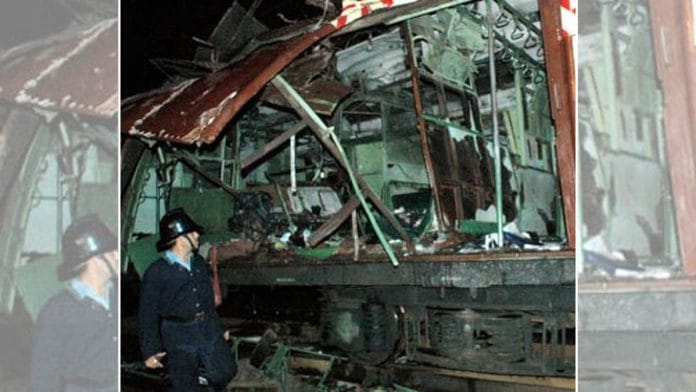Seven blasts ripped through Mumbai’s crowded suburban railway network at peak hour on 11 July 2006, leaving 187 dead. The bombing also left hundreds maimed for life.
The Maharashtra Control of Organised Crime Act (MCOCA) Special Court had sentenced five of the accused to death and seven to life imprisonment in 2015. Ten years later, the Bombay High Court acquitted all 12 convicted in the case. The court heard depositions by over 142 witnesses, including personnel from the Maharashtra Anti-Terrorism Squad (ATS) and survivors of the bombing. It also studied voluminous reports before arriving at the verdict.
The Mumbai train blasts case had been dismissed primarily on technical grounds, such as flawed identification of the accused by eyewitnesses and procedural irregularities in identification. The Bombay High Court also dismissed the evidence recovered from the accused, including RDX and other material like chemicals, books, maps, mobile phones, circuit boards, pressure cookers, Saudi currency, computer discs, cassettes, wires and other components like detonators. The material was found to have “no evidentiary value” due to a complete failure to follow standard procedures. Ironically, the Bombay High Court chose to overlook important evidence only because ‘standard procedures’ were not followed.
Duty toward citizens
The acquittal by the Bombay High Court exposes serious chinks in India’s anti-terrorism armour. The Maharashtra government’s appeal could lead to justice for the victims’ families. On Thursday, the Supreme Court stayed the high court order since it could impact pending cases under MCOCA. However, the acquitted men are not required to return to prison.
Both the investigation agencies and the courts have a duty towards the citizens. The motive, modus operandi, and the choice of the target must be thoroughly investigated. Terrorists often choose ‘soft targets’ with large crowds, ensuring greater damage and chaos. This also generates maximum media attention.
Besides civilian and military targets, terrorists also target areas of economic importance like the stock market, banks, and industrial clusters. The attacks on the World Trade Centre, the London Underground, and the Taj Mahal Palace fall into this pattern.
The choice may also depend on the demographic profile, aimed at targeting one particular community, triggering communal conflicts, and creating a schism in the social fabric.
By targeting the busy train compartments, the terrorists’ strategy in the Mumbai train blasts case was to draw maximum media attention and create a psychological impact.
Also read: Pakistani accomplices, shootouts, sealed chargesheet—how the 7/11 blasts case fell apart
Build a strong case
What’s unfortunate in the 2006 terror attack acquittals is how the court ruled the evidence presented by the Maharashtra ATS as unreliable, stating that the entire case was built on eyewitness accounts, recoveries of explosives, and confessional statements. Several other terror attack cases have been concluded by following these methods. So, it is surprising that the high court didn’t find them worthy of legal scrutiny.
At the same time, the court’s observation on the shoddy handling of evidence should be taken note of, and the personnel responsible for this negligence should be penalised.
Now that the Maharashtra government’s challenge has led to a stay on the order, it should now see that the agencies build a foolproof case and put up a strong defence. Legal and procedural loopholes must not be allowed to frustrate its attempt to punish the culprits.
It will be a huge blow to the country’s anti-terrorism mechanism if this case becomes a precedent to decide other terror attack cases. Not only will it affect the morale of the agencies, but it will also hurt the judiciary’s credibility.
Seshadri Chari is the former editor of ‘Organiser’. He tweets @seshadrichari. Views are personal.
(Edited by Prasanna Bachchhav)






